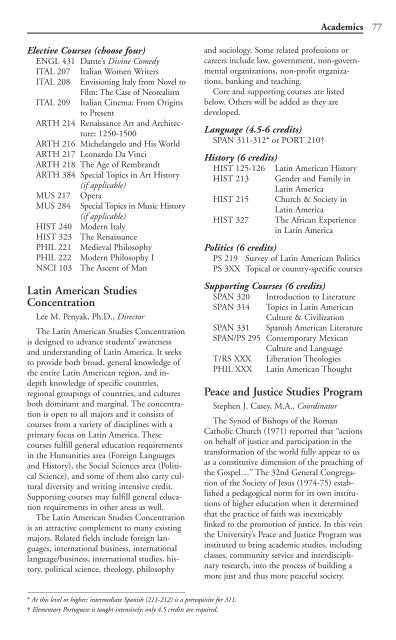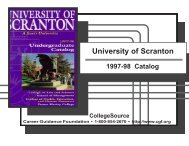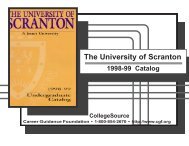2003-2004 - The University of Scranton
2003-2004 - The University of Scranton
2003-2004 - The University of Scranton
You also want an ePaper? Increase the reach of your titles
YUMPU automatically turns print PDFs into web optimized ePapers that Google loves.
Elective Courses (choose four)<br />
ENGL 431 Dante’s Divine Comedy<br />
ITAL 207 Italian Women Writers<br />
ITAL 208 Envisioning Italy from Novel to<br />
Film: <strong>The</strong> Case <strong>of</strong> Neorealism<br />
ITAL 209 Italian Cinema: From Origins<br />
to Present<br />
ARTH 214 Renaissance Art and Architecture:<br />
1250-1500<br />
ARTH 216 Michelangelo and His World<br />
ARTH 217 Leonardo Da Vinci<br />
ARTH 218 <strong>The</strong> Age <strong>of</strong> Rembrandt<br />
ARTH 384 Special Topics in Art History<br />
(if applicable)<br />
MUS 217 Opera<br />
MUS 284 Special Topics in Music History<br />
(if applicable)<br />
HIST 240 Modern Italy<br />
HIST 323 <strong>The</strong> Renaissance<br />
PHIL 221 Medieval Philosophy<br />
PHIL 222 Modern Philosophy I<br />
NSCI 103 <strong>The</strong> Ascent <strong>of</strong> Man<br />
Latin American Studies<br />
Concentration<br />
Lee M. Penyak, Ph.D., Director<br />
<strong>The</strong> Latin American Studies Concentration<br />
is designed to advance students’ awareness<br />
and understanding <strong>of</strong> Latin America. It seeks<br />
to provide both broad, general knowledge <strong>of</strong><br />
the entire Latin American region, and indepth<br />
knowledge <strong>of</strong> specific countries,<br />
regional groupings <strong>of</strong> countries, and cultures<br />
both dominant and marginal. <strong>The</strong> concentration<br />
is open to all majors and it consists <strong>of</strong><br />
courses from a variety <strong>of</strong> disciplines with a<br />
primary focus on Latin America. <strong>The</strong>se<br />
courses fulfill general education requirements<br />
in the Humanities area (Foreign Languages<br />
and History), the Social Sciences area (Political<br />
Science), and some <strong>of</strong> them also carry cultural<br />
diversity and writing intensive credit.<br />
Supporting courses may fulfill general education<br />
requirements in other areas as well.<br />
<strong>The</strong> Latin American Studies Concentration<br />
is an attractive complement to many existing<br />
majors. Related fields include foreign languages,<br />
international business, international<br />
language/business, international studies, history,<br />
political science, theology, philosophy<br />
* At this level or higher; intermediate Spanish (211-212) is a prerequisite for 311.<br />
† Elementary Portuguese is taught intensively; only 4.5 credits are required.<br />
Academics 77<br />
and sociology. Some related pr<strong>of</strong>essions or<br />
careers include law, government, non-governmental<br />
organizations, non-pr<strong>of</strong>it organizations,<br />
banking and teaching.<br />
Core and supporting courses are listed<br />
below. Others will be added as they are<br />
developed.<br />
Language (4.5-6 credits)<br />
SPAN 311-312* or PORT 210†<br />
History (6 credits)<br />
HIST 125-126 Latin American History<br />
HIST 213 Gender and Family in<br />
Latin America<br />
HIST 215 Church & Society in<br />
Latin America<br />
HIST 327 <strong>The</strong> African Experience<br />
in Latin America<br />
Politics (6 credits)<br />
PS 219 Survey <strong>of</strong> Latin American Politics<br />
PS 3XX Topical or country-specific courses<br />
Supporting Courses (6 credits)<br />
SPAN 320 Introduction to Literature<br />
SPAN 314 Topics in Latin American<br />
Culture & Civilization<br />
SPAN 331 Spanish American Literature<br />
SPAN/PS 295 Contemporary Mexican<br />
Culture and Language<br />
T/RS XXX Liberation <strong>The</strong>ologies<br />
PHIL XXX Latin American Thought<br />
Peace and Justice Studies Program<br />
Stephen J. Casey, M.A., Coordinator<br />
<strong>The</strong> Synod <strong>of</strong> Bishops <strong>of</strong> the Roman<br />
Catholic Church (1971) reported that “actions<br />
on behalf <strong>of</strong> justice and participation in the<br />
transformation <strong>of</strong> the world fully appear to us<br />
as a constitutive dimension <strong>of</strong> the preaching <strong>of</strong><br />
the Gospel…” <strong>The</strong> 32nd General Congregation<br />
<strong>of</strong> the Society <strong>of</strong> Jesus (1974-75) established<br />
a pedagogical norm for its own institutions<br />
<strong>of</strong> higher education when it determined<br />
that the practice <strong>of</strong> faith was inextricably<br />
linked to the promotion <strong>of</strong> justice. In this vein<br />
the <strong>University</strong>’s Peace and Justice Program was<br />
instituted to bring academic studies, including<br />
classes, community service and interdisciplinary<br />
research, into the process <strong>of</strong> building a<br />
more just and thus more peaceful society.
















